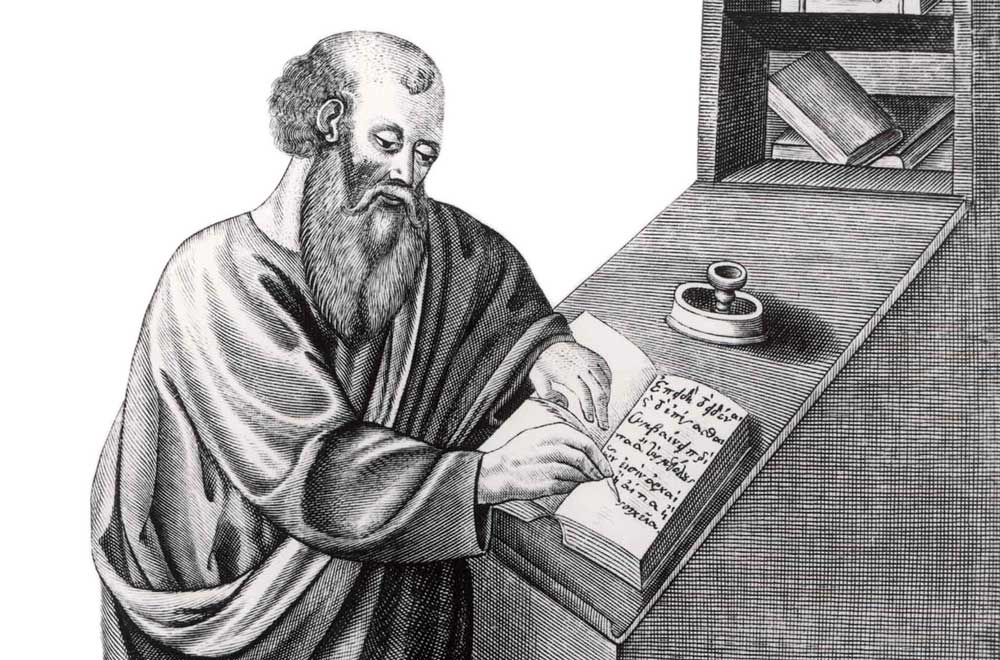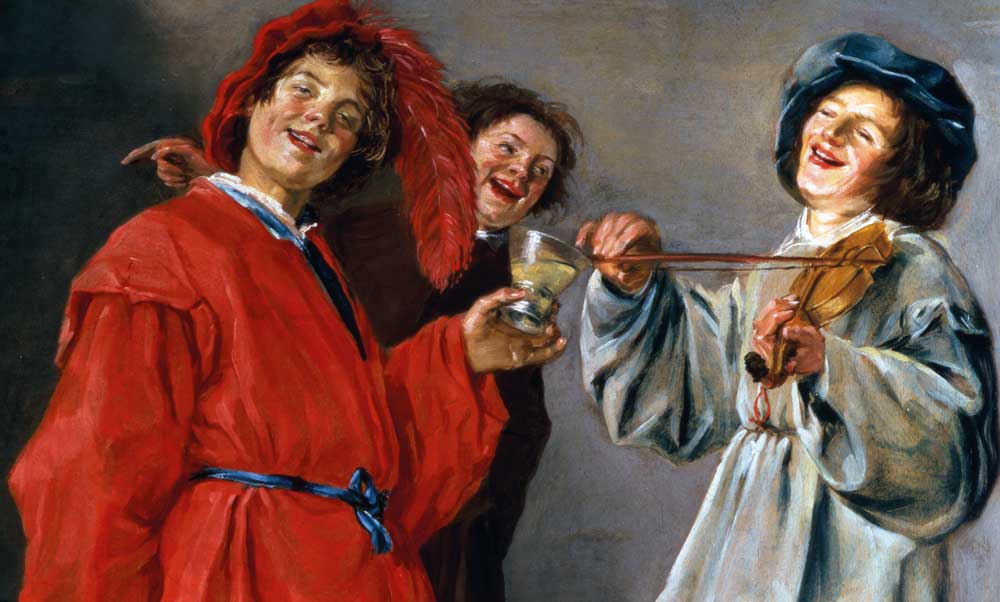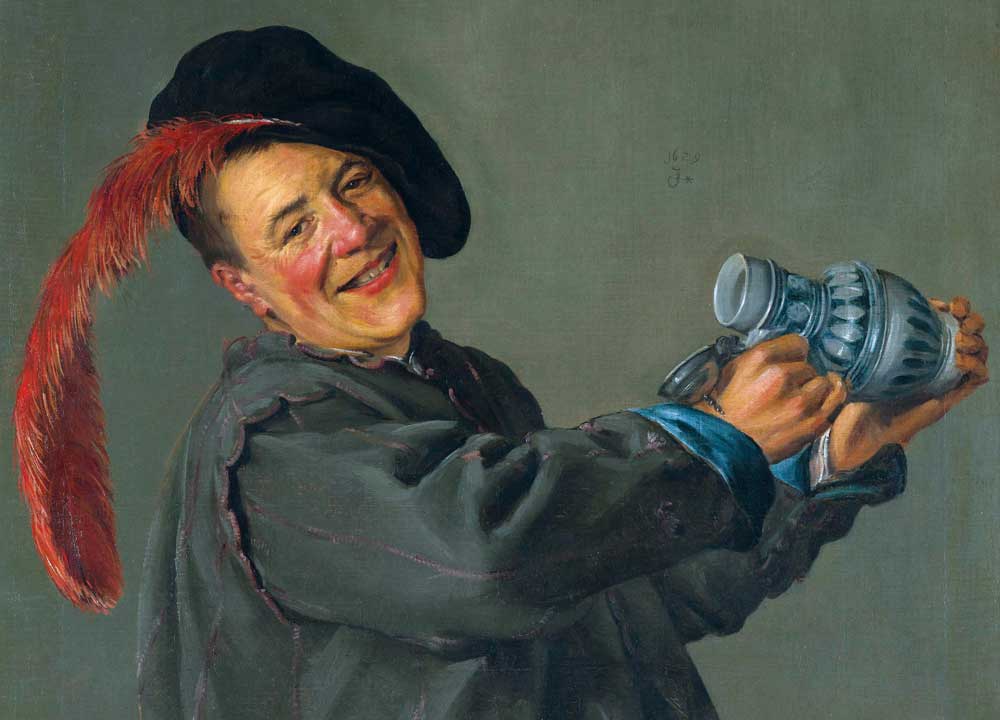No Laughing Matter | History Today - 10 minutes read

In Umberto Eco’s The Name of the Rose (1983), laughter is no laughing matter. Set in 1327, the story follows William of Baskerville as he investigates a series of mysterious deaths at a Benedictine monastery, high in the Italian Alps. Quite by chance, he comes across the manuscript of a Greek comedy in one of the victims’ desks. Remembering that the blind librarian, Jorge of Burgos, had argued with the dead man about humour only a few days before, he realises that this might be a clue and suspects that Jorge is hiding something. To test this, he strikes up a discussion about laughter. A bitter disagreement soon arises. Whereas William maintains that laughter is good for the soul, Jorge denounces it as an ‘unnatural’ affront to humanity and an incitement to blasphemy, which he justifies with reference to the Bible. But it soon becomes apparent that his hatred of laughter – and one of the victims – has been inspired by a quite different book. A lost book.
By the early 14th century there were plenty of treatises that touched on the question of laughter. But none was more tantalising, or elusive, than Aristotle’s Poetics. As its title suggests, it had been intended as an enquiry into poetry. Most of the first book is devoted to a discussion of tragedy. But, along the way, Aristotle gives a quick definition of comedy, too. Like tragedy, he argues, comedy is a representation of real life. Where it differs is that its subjects are ‘inferior people’: not so base as to be villainous, but ‘disgraceful’ enough to be ‘laughable’. This leads him to reflect further on laughter itself. Elsewhere, he had already noted that laughter is unique to man and aims at giving pleasure. Here, he adds that what makes us laugh at something is ‘some error or disgrace which is neither painful nor life-threatening; as, for example, a comic mask is ugly and distorted, but does not cause pain’.
As definitions go, this is pretty thin. Although Aristotle makes it clear that laughter is a form of disdain, distinct from mockery, he does not explain what sorts of errors and disgrace make a person ridiculous, what sort of pleasure laughter confers, whether any other dramatic devices are needed to elicit a chuckle, or if any other types of laughter are possible. He probably intended to answer these in another part of his treatise. At various points, he promises that there is more to come; some later authorities (Diogenes Laertius, Boethius, etc.) indicate that, in its original form, the Poetics contained at least two books. But at some point in late antiquity the second was lost.
For more than 1,000 years scarcely a trace of the lost treatise remained in the Latin West, beyond a handful of second-hand remarks. In 1839, however, a manuscript was found in the Bibliothèque nationale de France which looked like a summary of the missing text. Since then, this has been used as the basis for a possible reconstruction. But the manuscript is so garbled that some scholars doubt its authenticity and feel that Aristotle’s full philosophy of laughter may be gone forever.

In The Name of the Rose, however, Eco imagines that by some miracle, a single copy has survived in the monastery library. As William of Baskerville guesses, it presents laughter ‘as a force for good’, which, far from leading us into error, can actually help us to reach the Truth. But Jorge is horrified. Although he rejects this argument utterly, he is afraid that, if the book’s existence were to be revealed, somebody, inspired by Aristotle’s authority, would turn laughter into a weapon and overthrow all that is holy. When one of the monks takes an interest in it, Jorge kills him by smearing its pages with arsenic. Then, when William exposes the crime, Jorge destroys it (and himself) by eating the deadly leaves and burning the library to the ground.
It is a gripping tale. But insofar as the history of laughter is concerned, the loss of the second book is even more intriguing than any fictional account of its survival.
Serious enquiry
For a long time, the first book of the Poetics attracted little attention in the Latin West. Although Herman the German produced a Latin translation of Averroes’ paraphrase in 1256 and William of Moerbeke translated the treatise itself a little under two decades later, it was almost completely ignored. Aside from a few brief allusions to Herman’s paraphrase, it had little impact on intellectual life – and even less on laughter.
With the publication of Giorgio Valla’s Latin translation in 1498, however, all that changed. There was an explosion of interest in Aristotle’s treatise and within a matter of decades it had inspired a whole new way of thinking about mirth. As Quentin Skinner has pointed out, laughter became the subject of serious enquiry for the first time and a number of prominent humanists – including Baldassare Castiglione and Juan Luis Vives – devoted themselves to exploring its causes and implications. By the end of the 16th century Aristotle’s Poetics had also inspired a burgeoning medical interest in laughter. And, in time, philosophers such as René Descartes, Thomas Hobbes and Baruch Spinoza even began to question ‘the place of laughter among the emotions’.
Like Aristotle, everyone agreed that laughter was unique to man and that it was accompanied by a feeling of pleasure. In Il Cortegiano, for example, Castiglione noted that laughter is ‘nearly always the sign of a certain inward hilarity of the spirit, which is naturally attracted to pleasure and desirous of rest and recreation’, while in De Anima et Vita, Vives noted that ‘from happiness and delight laughter is born’. Following the first book of the Poetics, however, they also recognised that it entailed disdain and had as its object the base, the disgraceful and the ugly. As Castiglione put it: ‘The source of the ridiculous is to be found in a kind of deformity; for we laugh only at things that contain some elements of incongruity and seem disagreeable though they are not really so.’ Similarly, Joubert argued that we find risible anything which seems ‘ugly, deformed, dishonest, indecent, nefarious and inappropriate’.

But in the absence of any further guidance the second book of the Poetics might have provided, many ‘philosophers of laughter’ found that if they wanted to develop these ideas any further they would have to fill in the gaps left by Aristotle’s extant definition. Some could be dealt with simply enough and without doing too much violence to the spirit of the original. Aristotle’s reticence about the exact meaning of ‘errors’, for example, was easily resolved. Since he had insisted that the objects of laughter should not be truly wicked, but merely ‘disgraceful’, Castiglione inferred that one such error might be ‘affectation’, a failure to observe a certain moderation in one’s behaviour. This could manifest itself in many ways, but was most commonly associated with avarice, vanity, or even hypocrisy – as comic characters like Shakespeare’s Malvolio and Molière’s Tartuffe testify.
So, too, Aristotle’s silence on the dramatic devices needed to elicit laughter was readily filled. Building on a suggestion made by Cicero in the De oratore, many writers came to stress the importance of surprise. The physician Girolamo Fracastoro – today best known for giving syphilis its name – contended that: ‘The things that generally move us to laughter must have a certain novelty about them’ and must appear ‘suddenly’ and ‘unexpectedly’. So, too, in The Elements of Law, Thomas Hobbes argued that: ‘Whatsoever it be that moveth Laughter, it must be new and unexpected.’
Guilty pleasures
But other issues thrown up by Aristotle’s definition were less fortuitously resolved. Of these, the most serious was the question of pleasure. However obvious it might have been that laughter was a source of joy, the fact that it also seemed to involve disdain caused some puzzlement. After all, how could one feel happy and disdainful at the same time? That some thought ‘disdain’ too mild a term for the reaction evoked by ‘disgrace’ only made the problem more acute. For some, burning with moral zeal, contempt was a better word. As Robert Burton argued in the Anatomy of Melancholy, when we laugh, we ‘contemne others, condemne the world of folly’. Others, like Sir Thomas Browne, even preferred to speak of scorn or hatred. Either way, it seemed light years away from happiness.
One possible solution was proposed by Hobbes. Although in The Elements of Law he granted that it was possible merely to laugh at the absurdity of the world when we encounter something contemptible, he found it more convincing to believe that we experience joy only when comparing ourselves favourably with others. In other words, when we laugh we must have recognised some contemptible fault in another person and, in doing so, derived some pleasurable sense of superiority. But it was hardly the sort of thing one could imagine Aristotle endorsing with any enthusiasm.

A more satisfactory approach might be to ask whether laughter always needed to be so disdainful. As the Cretan cleric Paolo Beni noted in his commentary, ‘comedy non uncommonly depicts good men … and represents them with praise’. Perhaps there were other, less judgemental, types of laughter that Aristotle had simply not mentioned? What about the laughter of children, for example? Or how we laugh when something nonsensical happens? Or when our expectations are confounded? But this cut little ice with Aristotelian purists. For Nicander Jossius, the very idea was absurd. Since Aristotle had only mentioned disdainful laughter, he argued, anything that was not disdainful was obviously not real laughter. Philip Sidney took this a step further. In his view, pleasure was just incidental; the only thing that provoked true laughter was scorn.
As Skinner has pointed out, part of the reason for this grim pig-headedness was that it fitted with how such writers viewed the broader purpose of laughter. Despite Aristotle’s insistence on joy in the Rhetoric, his definition of laughter in the Poetics was so sketchily drawn that many felt justified in conflating it with Horace’s suggestion that comedy should teach people how to be good. By laughing disdainfully at ‘inferior’ characters, the argument went, we not only feel superior to them, but also feel contemptuous of the vices they represent. So if you wanted to be good, you had to laugh at the bad, regardless of whether you took any real pleasure in it.
The laughter paradox
Whether the second book of the Poetics would have forestalled this line of thought had it survived is moot. We just can’t know. But what is certain is that, in its absence, the emphasis on disdain led laughter into paradox. By the mid-17th century it dawned on moralists that, if laughter was used to make men good, it might inadvertently end up trashing society in the process. One possibility was that the contempt it expressed could cause fights, as Hobbes argued, thus undermining the laws of nature; or its boisterous carping would become so extreme that it might itself become the sort of immoderate (and uncivilised) artifice its exponents had set out to mock in the first place. Either way, it stood to threaten the morality it was supposed to cultivate. Put another way, the loss of Poetics II risked causing precisely the sort of spiritual crisis that Jorge of Burgos wanted to avoid by destroying it. There is perhaps some irony in this. But for those who had put their hopes in Aristotle, it certainly wasn’t a laughing matter either.
Alexander Lee is a fellow in the Centre for the Study of the Renaissance at the University of Warwick. His latest book, Machiavelli: His Life and Times, is now available in paperback.
Source: History Today Feed